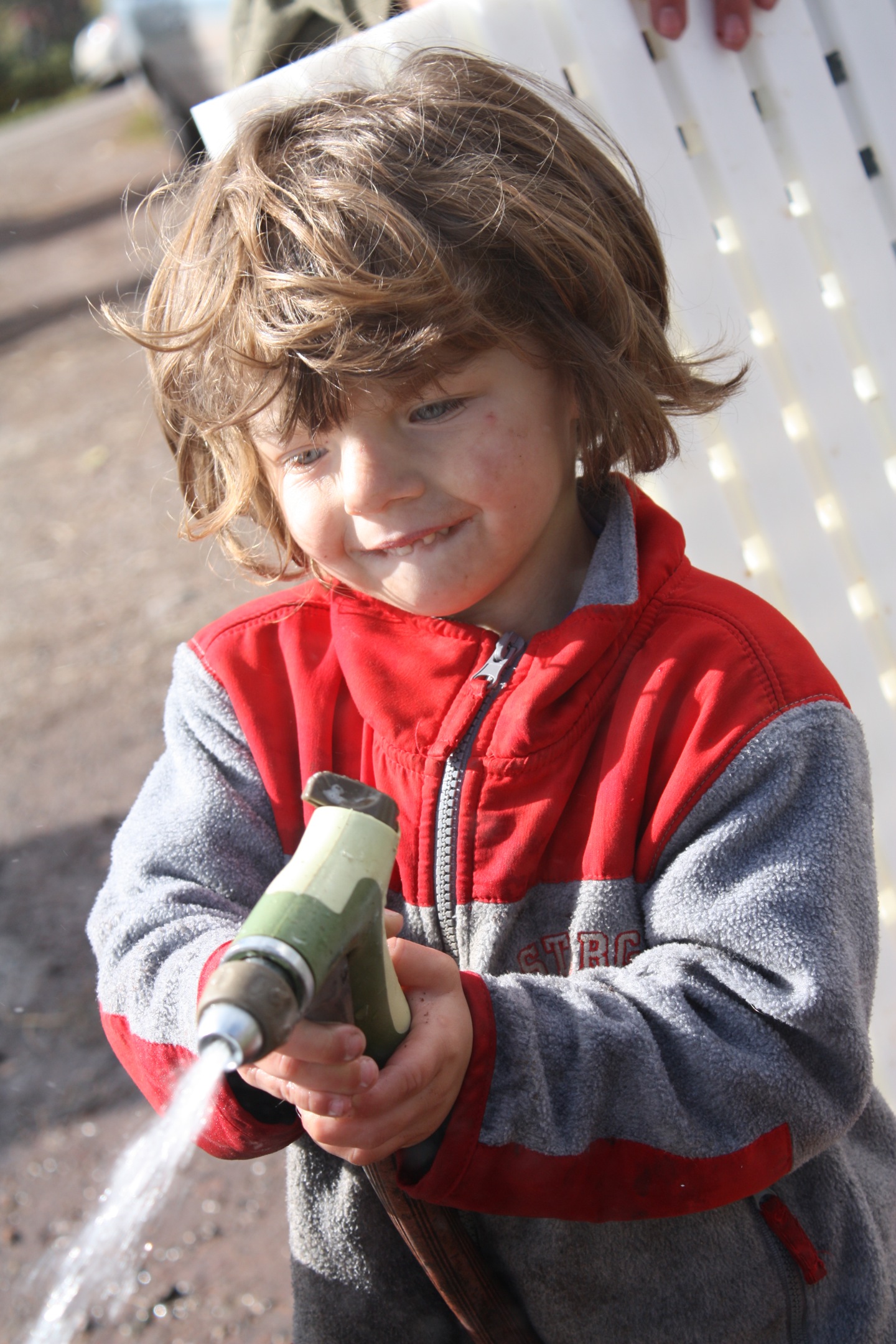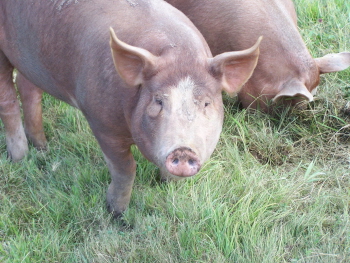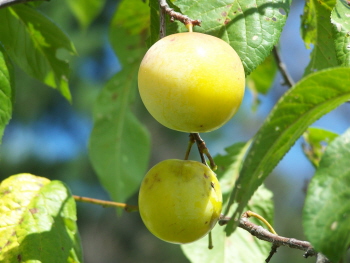The Farm Business
Human Resources
Jeff and Cindy do not formally track their time spent on the farming business. It generally takes two hours in the morning and two hours in the afternoon to do chores when the season is in full swing. They’re working toward setting aside at least an hour per day to handle emails and other office work during the summer. There are pulses of activity, generally involving whole weekends, surrounding poultry processing, fruit harvesting, and cider pressing. They also try to plan one big project, such as developing a new brooder or planting a new orchard, per month, to move various initiatives forward.
As described under Assessing & Planning > Getting Started, Jeff works on the farm full-time during the summer while Cindy continues working close to half-time at her academic appointment. They are 1½ years into a 3 to 5 year plan, in which the goal is for Cindy to increase the percent of time she is on the farm both during the school year and in the summer. If they could figure out how to get affordable health insurance while being self-employed, they might consider having Jeff work full-time on the farm, too. They have never expected the farm to support both of them, but they realize the future is uncertain and are open to the possibilities! Both Jeff and Cindy already work to integrate their off-farm careers with Clover Valley Farms, and Cindy sees good potential for research or teaching opportunities to present themselves as the sustainable agriculture movement continues to grow (see Professional Development).
Cindy manages most of the communications, record keeping, and other administrative work. Jeff manages most of the greenhouse production. They divide responsibilities for planning, scheduling, poultry and hog care, orchard establishment and maintenance, fruit harvest, poultry processing, cider pressing, and equipment maintenance. Cindy and Jeff feel that ideally each of them would be able to perform all tasks, and they work toward this goal. Jeff, for example, is learning QuickBooks and helping more with bookkeeping so he feels more connected to that part of the business.
In reality, they recognize each of them has different strengths. They get help with farm tasks from daughter May, who likes to collect eggs, feed chickens, and work in the garden. She is also a huge help at cider pressing time, and Cindy and Jeff think it won’t be too much longer before she’s moving poultry pens across the pasture!
|
 |
Educator’s Perspective: Resource Tip Small farmers often underestimate the responsibilities involved in being an employer. Although most farmer-employee relationships go well, the rare cases in which someone is injured or feels mistreated can cause big problems. Tax penalties and audits are also bad for business! Calling someone an intern or an independent contractor is not the easy way out that many hope it would be. For the protection of themselves as well as those they are intending to help through employment and educational opportunities, it is strongly recommended that small farmers understand hiring rules and regulations. Jennifer Jambor-Delgado with the Farmers’ Legal Action Group held a session, called “Know the Law,” on this subject at the SFA conference in 2011. The Northeast Organic Farming Association of New York published Internships In Sustainable Farming: A Handbook For Farmers (PDF, 218 kb) in 1999. It includes an overview of dealing with labor regulations. Although not specific to farmers, An Employer’s Guide to Employment Law Issues in Minnesota (PDF, 1.22 Mb) (there are similar guides in other states) provides a starting point for understanding requirements and issues such as verifying eligibility to work, wages, workplace discrimination, workers’ compensation, occupational safety, and unemployment insurance. As business owners, farmers also need to be aware that the U.S. Internal Revenue Service (IRS) has strict rules about whether someone providing services can be considered an independent contractor rather than an employee. Farmers are encouraged to review the IRS’s Common Law Rules carefully and consult a tax professional, rather than assuming that the “independent contractor” label can save them the hassle of employment taxes. |
Jeff and Cindy had an intern for the first time in 2010. Until then, they had called on neighbors to cover chores if they had to be off-farm for a few days, but in 2010 they needed to be absent from the farm for a longer period of time. Their first intern, who lived nearby, was paid and worked an intermittent schedule, helping with chores when they were gone and with projects as needed. Jeff and Cindy quickly saw how the extra help could allow them to explore new revenue streams and expand their current enterprises further, and they liked being able to contribute to the growth of a future farmer. They envisioned a more structured approach for the future, where interns would have designated areas of responsibility tailored to their goals and abilities.
In 2011, Cindy and Jeff hired two interns who lived on the farm. They worked with the interns, who had no prior farm experience, to select topics that each intern could explore in depth, often related to developing new resources or products for the farm. For example, the interns took the lead on using rooster feathers to make hair extensions, which have become popular in hair salons. They experimented with a range of materials, and their designs, plus others created by Cindy, are now being sold through a local hair salon. The interns also took the lead in developing materials, such as handouts, displays, and signage, used for field days on the farm. An informational poster they developed even became the basis for Cindy and Jeff’s new Web site. The interns were also involved in communicating with customers so they could learn the people skills of direct marketing. Cindy and Jeff concluded the internships with a day of picnicking and hiking, using the time to “debrief” the summer with their interns. They felt this step was an invaluable two-way exchange of ideas that gave them an understanding of what worked and what didn’t about the experience and left them feeling more prepared to provide an even better learning experience for interns in 2012.
Spotlight on: Intern’s Perspective Matt worked with Cindy and Jeff in 2010. He has a background in horticulture and liked learning about not only the details of Cindy and Jeff’s fruit production but also helping with their on-farm research. Matt lives nearby and is experimenting with starting his own orchard on family land. He is especially interested in cider production, because the management focus doesn’t have to be on producing aesthetically pleasing apples – just healthy apples that can be used in a variety of value-added products. One of the lessons Matt takes away from the intern experience is seeing firsthand how everyone does things a little differently. He didn’t learn this in his textbooks, but when it comes to farming, there is often more than one way to do something and get it right.  |
Volunteers have always played an important role at Clover Valley Farms. They are especially crucial on poultry processing day, when the right number of people is key to avoiding bottlenecks. Four people is considered the minimum, but six to eight is ideal. With more people to help at the processing table, the initial steps don’t get as backed up. Cindy and Jeff recruit volunteers from a variety of acquaintances – friends, colleagues, neighbors, and customers. They’ve found that on-farm processing attracts considerable interest from customers who want to learn more about where their food comes from and who are willing to help in exchange for reduced price or free birds. Cindy and Jeff feel volunteers offer a win-win situation: they get the quality help they need at peak times, and the volunteers get a positive experience plus a break on poultry costs.
 |
 |


